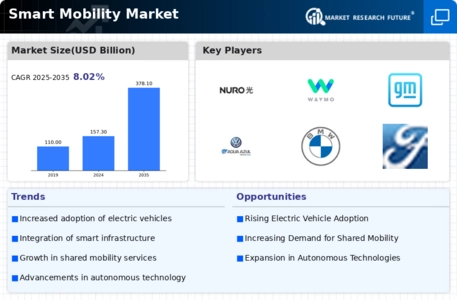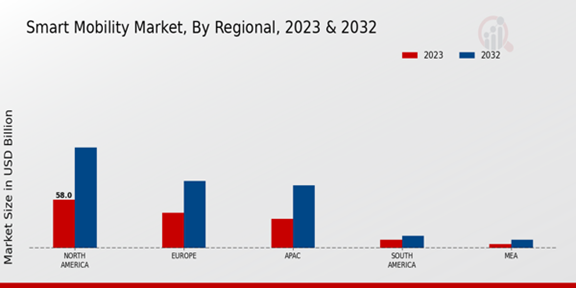Market Growth Projections
The Global Smart Mobility Market Industry is experiencing robust growth, with projections indicating a substantial increase in market size. By 2024, the market is expected to reach 157.3 USD Billion, driven by various factors such as urbanization, technological advancements, and government initiatives. Furthermore, the market is anticipated to expand significantly, reaching 378.1 USD Billion by 2035. This growth trajectory suggests a compound annual growth rate (CAGR) of 8.3% from 2025 to 2035. Such projections underscore the increasing importance of smart mobility solutions in addressing urban transportation challenges and enhancing overall mobility efficiency.
Technological Advancements
Technological advancements play a crucial role in shaping the Global Smart Mobility Market Industry. Innovations in artificial intelligence, the Internet of Things, and big data analytics are transforming transportation systems. These technologies enable real-time data collection and analysis, enhancing the efficiency of mobility solutions. For example, smart traffic lights that adapt to real-time traffic conditions are being deployed in various cities, improving traffic flow. The integration of autonomous vehicles is also on the rise, potentially revolutionizing personal and public transport. As these technologies evolve, they are likely to drive market growth, contributing to a projected CAGR of 8.3% from 2025 to 2035.
Urbanization and Population Growth
The rapid urbanization and population growth across the globe are pivotal drivers of the Global Smart Mobility Market Industry. As cities expand, the demand for efficient transportation solutions intensifies. By 2024, the market is projected to reach 157.3 USD Billion, reflecting the urgent need for innovative mobility solutions. Urban areas are increasingly adopting smart technologies to alleviate congestion and enhance public transport systems. For instance, cities like Singapore and Amsterdam are implementing smart traffic management systems that optimize flow and reduce travel times. This trend is expected to continue, with the market anticipated to grow significantly as urban populations increase.
Rising Demand for Connected Vehicles
The rising demand for connected vehicles is a key driver of the Global Smart Mobility Market Industry. Consumers are increasingly seeking vehicles equipped with advanced connectivity features that enhance safety, convenience, and overall driving experience. Connected vehicles utilize technologies such as vehicle-to-everything (V2X) communication to improve traffic management and reduce accidents. As automakers invest in these technologies, the market is likely to witness substantial growth. The integration of connected vehicle technologies is expected to contribute to the projected CAGR of 8.3% from 2025 to 2035, as consumers prioritize smart features in their transportation choices.
Government Initiatives and Investments
Government initiatives and investments in smart mobility infrastructure are vital to the growth of the Global Smart Mobility Market Industry. Many countries are recognizing the importance of modernizing transportation systems and are allocating substantial budgets for smart mobility projects. For example, the United States has launched various initiatives to enhance public transportation and promote smart city developments. These investments are expected to stimulate market growth, as they facilitate the deployment of advanced technologies and infrastructure. With increasing government support, the market is poised for significant expansion, potentially reaching 157.3 USD Billion by 2024, as cities strive to improve mobility and reduce congestion.
Environmental Concerns and Sustainability
Growing environmental concerns and the push for sustainability are significant drivers of the Global Smart Mobility Market Industry. Governments worldwide are implementing stringent regulations to reduce carbon emissions and promote eco-friendly transportation options. Electric vehicles and shared mobility services are gaining traction as viable alternatives to traditional vehicles. For instance, initiatives in Europe and North America are encouraging the adoption of electric public transport systems. As a result, the market is expected to expand, reaching an estimated 378.1 USD Billion by 2035. This shift towards sustainable mobility solutions not only addresses environmental issues but also aligns with global efforts to combat climate change.




















Leave a Comment